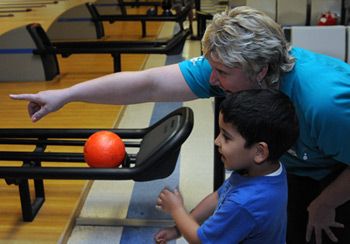As children grow, career choices are where this control magnifies into scary proportions.
Too many parents thrust their own aspirations and anxieties onto the child, says Anjuli Bhargava.
 The other day I happened to be in the park inside the Gurgaon condominium where I live.
The other day I happened to be in the park inside the Gurgaon condominium where I live.
Around me were several house helps and a few mothers keeping an eye on their children.
There was a playful three-year-old who seemed to be enjoying himself thoroughly -- a risk-taker as was evident by his antics.
I watched as the mother initially shouted instructions at him -- even while trying to keep a conversation alive on her mobile -- and then when she realised he was past listening, she abandoned the conversation and started monitoring what he was doing.
Monitoring is putting it mildly. She practically forbade him from moving.
"Don't do this, you will hurt yourself; don't do that, you will break your arm. Oh my god, stop it; you are climbing too high", and so on.
He moved and she panicked.
I watched in horrified silence as she smothered his spirit and transferred all her anxieties to the child.
She instilled fear where there was none to start with.
I remember thinking that if all she wanted him to do was to sit in a Buddha-like meditative pose, she had clearly brought him to the wrong spot.
While this happened in the playground, it is not uncommon to see this happen with parents who are raising their children at almost any age.
Over-anxious parents are trying to control their children's lives to ensure that nothing ever goes wrong.
Controlling and trying to make sure that things flow smoothly for their children comes naturally to parents, but one simply must know where to draw the line.
Parents may ask why.
If I can make sure something doesn't go wrong, why shouldn't I at least try?
My answer to that is: because you can do it once or maybe twice but not through life.
Let them make their own mistakes and learn from them.
If the child had indeed climbed too high, he might have fallen once and sustained some minor injury, but the experience would probably have taught him a lesson.
If, however, he climbed up high once, he might next time -- after tasting sweet success -- try to climb higher still.
Of course, you have to make sure he doesn't do something foolhardy, but by instilling your fears in him, you, in fact, do him a disservice.
This extends in later years to many other aspects.
As children reach their teens and their academics start to pinch into their free time, I have seen parents dropping "tennis or soccer" or insisting that she continues with her piano lessons.
"I drove them to these classes for four years; I can't let it go waste".
Well, you may well have been the one to insist on those classes to start with.
Let the child decide what he or she wants to pursue or not pursue.
You cannot force music, dance and the arts down someone's throat.
These are things that come naturally.
If she drops the piano and doesn't get back to it, maybe it was not for her to start with.
As children grow, career choices are where this control magnifies into scary proportions.
Too many parents thrust their own aspirations and anxieties onto the child.
"This is not the right career for you; I don't think you should even look at this" and so on.
Boys, of course, have it worse since the pressure to earn a living is often higher for them.
Career choices and decisions that affect their entire lives are taken by over-anxious and competitive parents -- usually at too early a stage.
Today I know three women in my age group -- all qualified doctors, including one with a specialised post-graduate degree -- who refuse to have anything to do with medicine, doctors and hospitals.
The sight of blood makes them queasy.
As students they were forced by their parents to study medicine (career choices being far more limited in the late 1980s and early 1990s) and went into it against their will.
Today, when they have a choice, they refuse to have anything to do with something they are quite uneasy with.
Effort, time (several years, in fact), money, energy and even seats at the medical colleges have, in effect, been wasted.
I'm not saying one should have a totally hands-off approach. Guide sensibly, by all means.
You can make life easier and smoother for them by offering the right advice.
You can lead them down the path but you can't hold their finger and take them to the finishing line.
Sometimes they will win and at other times they will learn.
Lead image used for representational purposes only. Image: US Army/Creative Commons












